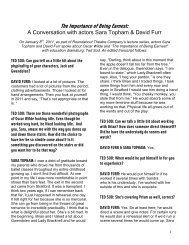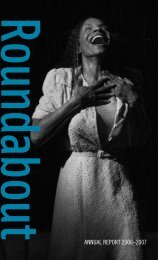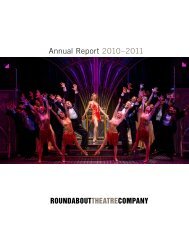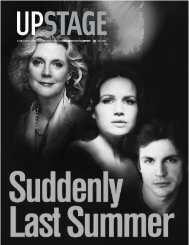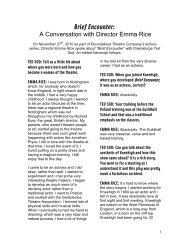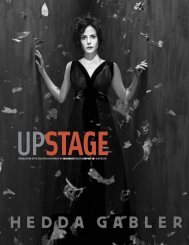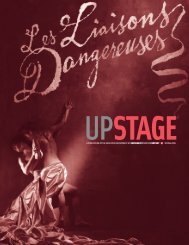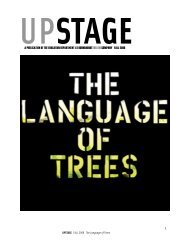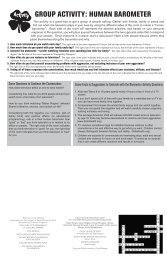Hedda Gabler Lecture Series - Roundabout Theatre Company
Hedda Gabler Lecture Series - Roundabout Theatre Company
Hedda Gabler Lecture Series - Roundabout Theatre Company
You also want an ePaper? Increase the reach of your titles
YUMPU automatically turns print PDFs into web optimized ePapers that Google loves.
<strong>Hedda</strong> <strong>Gabler</strong> <strong>Lecture</strong> <strong>Series</strong><br />
On January 24 th , 2009 as part of <strong>Roundabout</strong> <strong>Theatre</strong> <strong>Company</strong>’s ongoing <strong>Lecture</strong><br />
<strong>Series</strong>, Ted Sod, Dramaturg for the Education Department interviewed Patricia<br />
Denison, professor at Barnard College, followed by audience Q & A.<br />
Ted Sod: Ibsen is sometimes considered a pioneer or “the father of modern drama”. Do<br />
you agree?<br />
Pat Denison: That’s both a commonplace and an accurate description. If you think about<br />
early 19 th century drama, which is often highly melodramatic, you usually have<br />
predictable type-characters and plot-driven action. In the tradition, say, of Scribe and<br />
Sardou. Ibsen initially worked in the theater with conventional, well-made plays, where<br />
what really mattered was that predictable ending. A play would be structured with an<br />
Exposition, Complication, Crisis and Resolution. Sometimes playwrights such as Scribe<br />
and Sardou would first decide what the happy ending would be and then would write the<br />
rest of the play. You can see how remote that description is from the play that we saw on<br />
the stage today. Ibsen experimented with various dramatic conventions later in the<br />
century and wrote plays in which the world is unpredictable and characters behave in<br />
psychologically complex, unexpected ways. To paraphrase Strindberg, “no longer are the<br />
characters automatons, middle-class, predictable types, but they are hard to catch and<br />
classify. They may startle you with what they do.” I think that is why critics describe<br />
Ibsen as the playwright who created modern drama. They will sometimes describe<br />
Chekhov in a similar way.<br />
TS: So it’s true that he scandalized the Victorian middle class with his plays?<br />
PD: If you tend to think of the Victorian Era as one that placed tremendous emphasis on<br />
public propriety, rigid standards, and social conventions, then Ibsen was a playwright<br />
who resisted and addressed those conventions. He often wrote about characters who<br />
wanted to live a life that would not have been considered proper at the time.<br />
TS: Let’s talk about <strong>Hedda</strong>. Why was she such an iconoclastic character? He wrote it in<br />
1890…<br />
PD: Yes.<br />
TS: It was first produced in Munich…<br />
PD: Right.<br />
1
TS: … in 1891. The critics had very difficult time…<br />
PD: They certainly did.<br />
TS: …and yet the play has survived over a hundred years and actresses gravitate towards<br />
the role. It’s the most produced play, even more than A Doll’s House. Why is that?<br />
PD: Ibsen created a character with multiple motives for her behavior. The challenge for<br />
an actress is how can you make sense of such a character without simplifying that<br />
character? How can you provide the audience with access to the complexity of that inner<br />
life, yet not provide any easy answers? She’s an enigma; we puzzle over her inner life,<br />
what drives her. At some point in the play you think, “Ah! That’s what drives her!” Five<br />
minutes later you think, “No, it’s something else.”<br />
TS: She’s been variously described as a monster, a narcissist, solipsistic, degenerate,<br />
perverted, but that’s hard to see today, from a modern perspective; so what, from your<br />
point of view, is driving her?<br />
PD: There’s not a single answer. There’s a lot of speculation, and people come at it from<br />
multiple, diverse perspectives. The obvious point might be that this is not a play entitled,<br />
“<strong>Hedda</strong>”, although that is what Ibsen originally thought he would call the play. It’s<br />
clearly not “<strong>Hedda</strong> Tesman”, although in your program, Mary Louise Parker is described<br />
as Mrs. <strong>Hedda</strong> Tesman. I think, in part, you could say that General <strong>Gabler</strong>’s daughter is<br />
very much restrained by the 19 th century conventions that she has inherited. There’s a<br />
history, there’s a past. There are ghosts inside of her. But there’s also something inside of<br />
her that wants to rebel, that wants to be something other, to live a life. What, though, are<br />
her options as a woman in that society? Just look at those three men in her life. She says<br />
she “danced herself still”. She felt empty; she decided spontaneously, impulsively, to<br />
marry boring Tesman and live in this grand villa, but she didn’t really want to live there.<br />
She acknowledges that she can’t control her own self, yet she longs to control someone<br />
else’s destiny. That would be much more problematic in the 1890’s than it is now for a<br />
woman. How could you control your own destiny, when those social conventions were so<br />
constraining?<br />
TS: And Ibsen is sort of at the end of his life here, he is still writing…<br />
PD: Yes…<br />
TS: He writes a few more plays. He dies in 1906.<br />
PD: Yes.<br />
TS: But this play is a bit of a departure for him. Some of the plays that precede this deal<br />
with social issues, as it were. But there’s always this strain of psychology in behavior. All<br />
the great acting teachers teach us that it’s behavior that we’re opting for on the stage. Is<br />
2
Ibsen a forerunner of psychoanalysis in this case, because psychoanalysis was just<br />
coming into being.<br />
PD: The story is, of course, that Freud decided that he wanted to read this play in its<br />
original form, so he learned the language because he was intrigued by <strong>Hedda</strong> and wanted<br />
to read the original so he could have a closer understanding of her.<br />
TS: Audiences around the time that it was first performed in America, in Britain and in<br />
Germany, they had a difficult time with it, but Ibsen had some people who were<br />
supporting him. One was George Bernard Shaw. Who were the others who took on his<br />
cause?<br />
PD: Actually, Henry James was one who was very supportive. William Archer, also, was<br />
a critic who translated his work and brought it to England; he would be another key<br />
supporter. Edmund Gosse.<br />
TS: Let’s talk a little bit about Ibsen’s influence on American playwrights who followed<br />
him. Would you say he influenced O’Neill? Miller?<br />
PD: Most would agree that those playwrights would have been familiar with Ibsen’s<br />
work. If you think of, say, Long Day’s Journey into Night. The exploration of what is<br />
your past, your history, how does that inform you? And how does that shape your future?<br />
20 th century American playwrights investigated these kinds of issues, ones that were<br />
manifest in Ibsen’s work.<br />
TS: And <strong>Hedda</strong> today, if she existed among us…I seem to get the feeling that suicide<br />
might not be an option for a modern woman in the same predicament. That she might<br />
take anti-depressants. It’s very touching, in this particular adaptation, when <strong>Hedda</strong> says,<br />
“There’s nothing you can use me for?” I don’t know if that’s a direct quote…<br />
PD: Yes, it’s near the end. She approaches Tesman and Thea as they begin their project<br />
of putting Lovborg’s manuscript notes in order. She asks if she can be of any use, if<br />
there’s anything she can do. Tesman replies, “Not a thing in the world.”<br />
TS: “You can just go sit with Judge Brack.”<br />
PD: Yes… “just go over by the judge,” who is now “the only show in town,” the “top<br />
dog in the yard,” or to borrow a phrase from another translation, “the cock of the walk.”<br />
Brack delights in the power he has over <strong>Hedda</strong> now, and she finds it intolerable that<br />
someone else will control her, when she herself is so desperate to control other people’s<br />
destinies.<br />
TS (To Audience): Now it’s your turn to ask some questions. Allison’s going to walk up<br />
this side of the house…Any one have a question?<br />
3
Question: What is your impression of the adaptation? I’m trying to remember back when<br />
I had seen another adaptation. I saw the original adaptation, I think. I found this<br />
adaptation frightening…more than I remember…<br />
TS: There have been many, many adaptations; and many British adaptations. This is an<br />
American adaptation by Christopher Shinn, who’s thirty-three years old. What do you<br />
notice about this adaptation, Pat, compared to others?<br />
PD: I think in part the challenge for Christopher Shinn has been to make a classic play<br />
fresh. How can you get an audience to be startled by this play, perhaps in ways that the<br />
audiences were originally startled in the 1890’s? You were surprised to find her very<br />
frightening, more frightening than you found her in a previous adaptation. I think it is<br />
indeed played that way; there is no question that some of the lines, and onstage images,<br />
that you might remember from other adaptations and translations are not there. That is a<br />
clear choice in this adaptation. What’s our first image of <strong>Hedda</strong>? She was in a sexy,<br />
provocative pose, yes? So if you go back to one of the other adaptations are you likely to<br />
find stage directions that will say <strong>Hedda</strong> is reclined on the couch – I will be very<br />
Victorian-- semi-naked? Most likely not. Already you feel, right in the beginning, that<br />
she’s incredibly restless, confined, and you know that something complicated is<br />
happening internally. She is not a happy person at this point. So, Shinn and the director,<br />
Ian Rickson, are doing things that indeed are intended to shock and provoke you. They<br />
are encouraging you to see this play afresh.<br />
TS: I would like to add to Pat’s comments because I interviewed the adaptor Christopher<br />
Shinn for our study guide, which will appear online, probably this week at our website<br />
www.roundabouttheatre.org. He’s an Ibsen devotee. It was remarkable that Ian Rickson,<br />
suggested him to do the adaptation. Ian ran the Royal Court <strong>Theatre</strong> in Britain which does<br />
exclusively new work. And he had produced four of Christopher’s plays there. So he<br />
thought of Christopher, knowing that Christopher was highly influenced by Ibsen’s work.<br />
Christopher teaches at the New School and has his students read all of the Ibsen cannon<br />
of the prose plays as opposed to the poetic plays like Brand and Peer Gynt. He was<br />
highly affected as a teenager by a production he saw in 1991 of the Master Builder with<br />
Cynthia Nixon and Sam Waterston. Shinn has always believed in the power of Ibsen and<br />
Ibsen’s effect on modern playwriting and he said to me, “You know I feel so lucky<br />
because usually they would go to a much older playwright.” A thirty-three-year-old is<br />
considered very young in our business. He said, “I’m very lucky to be asked to this<br />
because I was chomping at the bit to do this.” It was a deliberate choice to find an<br />
American to do this adaptation. There are plenty of British adaptations. They wanted an<br />
American voice because most of the cast is American. Another question?<br />
Question: Was there a direct influence on Ibsen by Existentialism. Was he influenced by<br />
Nietzsche or others? Is there any proof of that in Ibsen’s letters?<br />
PD: Ibsen is not inclined to speak effusively and directly about his work, which is not<br />
unusual. He does speak of the importance of will and speak very directly about the<br />
4
difficulty for women in this period to exercise their will; so he does address those issues<br />
of identity. He does not say any where to my knowledge: “I am a follower of Nietzsche.”<br />
TS: Is there anything in any of his letters about his inspiration for <strong>Hedda</strong>?<br />
PD: There are references to characters that he based on people he had known in his life.<br />
On the other hand, he also said very explicitly that most artists have models, but models<br />
are very different than portraits. So he was drawing portraits and taking selectively from<br />
people he had known in his own life.<br />
TS: In the research I’ve done, one of the books I’ve read said that in writing <strong>Hedda</strong> he<br />
was responding to an affair that he’d had with an eighteen-year-old Viennese girl and it<br />
was the happiest time of his life – can you imagine? -- and this is what came out of it.<br />
PD: I’m not sure that he would describe it as an affair. He was in his sixties and there<br />
wasn’t just one, there were a number of young women. If you read The Master Builder<br />
which came right after this, there are obvious connections to young women. But just how<br />
far he, and Ibsen scholars, can go in saying exactly what happened -- that’s quite a murky<br />
area.<br />
Question: I would just like to get a clear explanation as to why <strong>Hedda</strong> married Tesman?<br />
TS: I don’t think <strong>Hedda</strong> knows.<br />
PD: Her ready answer was that she had danced herself to a place where she was empty<br />
and tired, and she reminds Brack: “I had a lot of admirers, but not many offers.” She<br />
looks pointedly at him; he says he prefers “triangular relationships” and marriage “in the<br />
abstract.” If you try to imagine <strong>Hedda</strong>’s options as a woman, you don’t feel that she had<br />
many. She might marry someone with a promising career. We recall that in the opening<br />
scene, Berte is told by <strong>Hedda</strong>, “You’re to call him Doctor.” Perhaps she hoped that she<br />
might have economic security and respectable standing in society by marrying Tesman.<br />
She even wonders whether Tesman might go into public service, but Brack just laughs<br />
and considers that possibility quite unlikely. <strong>Hedda</strong> displays aspirations for abstract<br />
“beauty,” a “hunger for life,” but she also yearns for a safe, respectable place in society.<br />
At a certain point, she felt she could no longer remain single; as she told Brack, her “time<br />
was up.”<br />
TS: Ibsen describes her as being twenty-nine.<br />
PD: Yes.<br />
TS: And so in the Victorian Era…<br />
PD: That was a spinster.<br />
5
Question: I had imagined that there had been an “old flame” tryst between Thea and<br />
Tesman at one point. Is that true?<br />
PD: What you’re remembering is the reference to Thea as Miss Riesling, which is what<br />
Tesman called Thea when she came in, and <strong>Hedda</strong> very quickly corrects him and refers to<br />
Thea as “your old flame”. And then Tesman replies, “but that was before I met you<br />
<strong>Hedda</strong> and it was very brief.”<br />
Question: You had mentioned that Henry James defended Ibsen. Could you talk more<br />
about how James responded to Ibsen?<br />
PD: When Ibsen was savaged by the English press, Bernard Shaw supported him as Ted<br />
said, and James also came to Ibsen’s defense early on and acknowledged the intellectual<br />
complexity of his characters and his work. These were characters that James himself<br />
recognized having dealt, himself, with very complicated women in his novels.<br />
Question: I believe that in The Wild Duck there’s a character that also commits suicide.<br />
Was there anything in Ibsen’s own life like that?<br />
TS: But in The Wild Duck, it was a mistake. Gregers doesn’t really want the daughter to<br />
commit suicide. The daughter commits suicide thinking that that’s what Gregers is<br />
suggesting, but he isn’t.<br />
PD: As far as Ibsen’s life, I don’t think that there’s a direct link to suicide. He was<br />
certainly not the first dramatist to have a woman commit suicide at the end of the play. It<br />
was not unusual for a woman to die at the end of a play because there was not a place for<br />
her in that world as it was constituted. For example in Pinero’s The Second Mrs.<br />
Tanqueray, the English play of 1892, Paula Tanqueray commits suicide at the end.<br />
TS: Chekhov uses a similar angle in The Seagull where Treplev commits suicide. It<br />
seems like it was a convention that allowed the writer to shock us.<br />
Question: I got the distinct impression that <strong>Hedda</strong> was with child …was <strong>Hedda</strong><br />
pregnant?<br />
TS: It does seem somewhat mysterious doesn’t it, Pat?<br />
PD: I think that your instincts are right, for there are numerous lines that support your<br />
idea: “Look at <strong>Hedda</strong> isn’t she just beautiful?” “Look how she’s filled out!” “How round<br />
and blooming.” And at those points you can see <strong>Hedda</strong> reacting; often she’s gesturing<br />
wildly, clenching her fists, moving her hands down to her stomach and up to her throat as<br />
though she’s suffocating. Toward the end, she says, “Jorgen, there’s something you<br />
should know – you may have begun to notice.” You expect that finally she may tell him,<br />
but she doesn’t finish; she says instead: “Go and ask Aunt Julie, she’s obviously the<br />
expert in this area.” That’s the moment in this production where Tesman gets down on<br />
6
his knees and puts his head on her belly and her hands go into that frenzy again. By this<br />
point, there’s little doubt that she’s pregnant.<br />
TS: Which makes the suicide even worse.<br />
PD: It’s a double suicide.<br />
Question: Was she pregnant by Tesman?<br />
PD: I don’t think that’s a question.<br />
TS: As much as she seems to be repulsed by the man she marries, I think she would also<br />
not allow herself to have sex with either Brack or Lovborg.<br />
PD: A fear of scandal haunts her.<br />
TS: And even though she may have had real feelings for Lovborg, she couldn’t marry<br />
him, because he was a social pariah. So she wouldn’t allow herself to marry someone<br />
who was on the outside of society.<br />
Question: I think there is something absolutely fascinating about <strong>Hedda</strong>. There’s<br />
something evil… beyond insensitivity…she has malice.<br />
PD: She’s an immensely skillful manipulator. She’s incredibly selfish; you can move her<br />
toward the demonic without much difficulty at all. As she’s burning the baby, the child,<br />
the manuscript in the fire, you often have flames reflecting on her face. This is someone<br />
who will go to extremes. Then you ask yourself what is this fascination I have with this<br />
woman? Someone who is so narcissistic, who is so committed to her own world and<br />
unwilling to make a commitment to others; she is rebelling against inner and external<br />
constraints. She is a classic rebel, who pushes and pushes and leans towards the demonic.<br />
TS: And she never gets to control the destiny of anyone other than her self. She’s trying<br />
to take control, but no matter how successful she is in burning the child/manuscript, the<br />
irony is that she’s trapped still. Ibsen doesn’t allow her to get away with any of this. So in<br />
some ways her malice catches up with her. She’s trapped between being the mistress of<br />
Brack and watching her husband create the same relationship with Thea that Thea had<br />
with Lovborg. It’s untenable for her. In many ways it’s sort of remarkable that this antiheroine<br />
is on the stage in 1890 and we’re still fascinated by her bad behavior. I know I<br />
am. I don’t always understand why she’s doing what she’s doing, but I’m quite curious<br />
why she’s so unhappy.<br />
PD: She’s a late-19 th century woman who has transgressive desires, yet she fears acting<br />
on them.<br />
TS: She doesn’t want to be discovered. She doesn’t want it to come out that she gave<br />
Lovborg the pistol. It’s almost as if she wants to get away with it and knows in her soul<br />
7
that she’s accomplished some sort of control over other people. But nothing works out to<br />
her satisfaction.<br />
PD: And at the end, after <strong>Hedda</strong> has shot herself in the temple, we hear Brack exclaim,<br />
“who would do such a thing!” We are left to wonder, to ask how? Why? Ibsen leaves us<br />
with the challenge of answering that question for ourselves.<br />
TS: I’d like to take this opportunity to thank Pat for joining us today. And thank you for<br />
coming to The <strong>Roundabout</strong>. The next lecture is for Distracted on February 28 th at the<br />
Harold and Miriam Steinberg Center for Theater and we hope to see you then. Thank you<br />
very much.<br />
8



